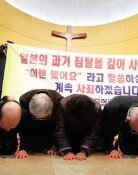Taiwan`s Presidential Election Reaches Climax
Taiwan`s Presidential Election Reaches Climax
Posted March. 22, 2008 08:15,
Taiwans presidential candidates have been campaigning hard ahead of elections today. In an attempt to clear the air regarding the issue of his U.S. green card, Taiwan`s opposition Nationalist Party candidate Ma Ying-jeou abruptly suspended scheduled campaign rallies and held a press conference, yesterday.
The green card, which I obtained while studying in the U.S., is invalid. I have lived in Taiwan for 27 years since I returned home from studying abroad, he said at a press conference. Although the press conference was held without much advance notification, around 300 journalists, domestic and foreign, attended.
Ma explained, Since I returned home in 1980, I have never visited the U.S. using the permanent residence card. I used a non-immigrant visa when I went there.
His elucidation came as his camp received information that Theresa Shaheen, former chairwoman of the American Institute in Taiwan, who is currently visiting the U.S., may prove Ma Ying-jeou`s green card is still valid. She has yet to make a public disclosure due to protests from the Nationalist Party.
Presidential contender Ma continuously emphasized, Voters do not need to be worry about such unfounded rumors. My green card is already invalid since it cannot be compatible with a non-immigrant visa.
The controversy over the green card erupted when Democratic Progressive Party candidate Frank Hsieh raised Mas green card issue, which was in turn aggravated as the Ma camp kept changing its statements from He has no green card to He has one, but its invalid.
As in this case, the last day before the Taiwanese presidential election campaign has been tainted by misgivings and debasement.
The ruling Democratic Progressive Party`s Frank Hsieh launched a series of street campaigns on Friday in the three major cities of Taizhong, Chiayi and Taipei. Hsieh questioned Mas legitimacy and eligibility as a presidential candidate given he came to Taiwan as a Chinese mainlander after 1949.
Ma, who also visited Taipei in the north and Kaohsiung in the south, responded by stressing that voters should not be lulled by the ruling partys malicious propaganda.
The most important issue among the public in the Taiwanese upcoming presidential election is how to revive the economy, which went sour under Taiwans incumbent President Chen Shui-bian and his party, the DPP. Though there are plans to expand relations with mainland China, presidential contenders do not seem to be concerned about this issue at the moment.
A taxi driver complained that, My monthly salary accounts for about 30,000 Taiwanese dollars. It hasnt changed over the past eight years. Its regrettable to see candidates engage in mudslinging instead of providing efficient measures to turn around the economy.
orionha@donga.com







